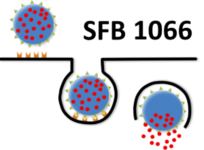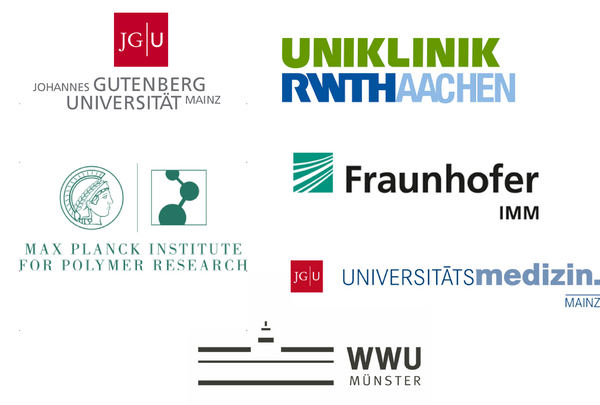Nanodimensional Polymer Therapeutics for Tumour Therapy (CRC 1066)

The Collaborative Research Centre (CRC) 1066 investigates the use of nanoparticulate drug carriers (NP) in tumour immunotherapy. Novel polymer- and lipid-based NPs are synthesised, chemically characterised and their application in complex biological systems is investigated. The aim is to activate the immune system of tumour patients in such a way that the tumours are recognised and destroyed by the body's own immune defence system. In addition to a tumour-specific immune response by vaccination, we aim at reactivating suppressed immune responses and targeted modulation of the tumour microenvironment. In the long run, we anticipate NPs to be applicable also beyond tumour immunotherapy, for example in regenerative medicine, to promote healthy ageing.
Since both the selectivity and the nature of the desired immune response must be precisely controllable, this creates a requirement for immunotherapeutic interventions with properties that cannot be met by conventional small molecules. This is exactly where the potential of nanoparticulate drug carriers lies, because due to their complex - but chemically selectively modifiable - structure they can (1) enclose active ingredients so that they are protected from untargeted release or early destruction, (2) transport multiple drugs simultaneously, and (3) can be modified by surface functionalisation in such a way that they bind to specific structures on cells or tissues, thus enabling targeted drug delivery.
The CRC 1066 reflects the growing importance of two modern research fields by applying the increasing power of nanomedicine to pressing problems in tumour immunotherapy. This task can only be accomplished by the highly interdisciplinary setup of the CRC 1066. Over two successful funding periods, our focus has systematically evolved from NP synthesis to their characterisation, functionalisation and application in living organisms. Building on this, we will now extensively test NP-based tumour immunotherapies in vivo and evaluate their clinical applicability.
For more information, please visit: https://sfb1066.de/
Contact:

Spokesperson:
Prof. Dr. Stephan Grabbe
Dermatology clinic & Polyclinic
University Medical Center, Johannes Gutenberg University Mainz
06131-17-2910

Deputy speaker:
Prof. Dr. Katharina Landfester
Max Planck Institute for Polymer Research
06131-379-170

Deputy speaker:
Prof. Dr. Pol Besenius
Department of Chemistry, Johannes Gutenberg University Mainz
06131-39-22355
Coordinator:
Dr. Michael Fichter
University Medical Center, Johannes Gutenberg University Mainz
Max Planck Institute for Polymer Research
06131-17-8791
Coordinator:
Dr. Michael Kuske
Dermatology clinic & Polyclinic
University Medical Center, Johannes Gutenberg University Mainz
06131-17-8793
Participating institutions:

